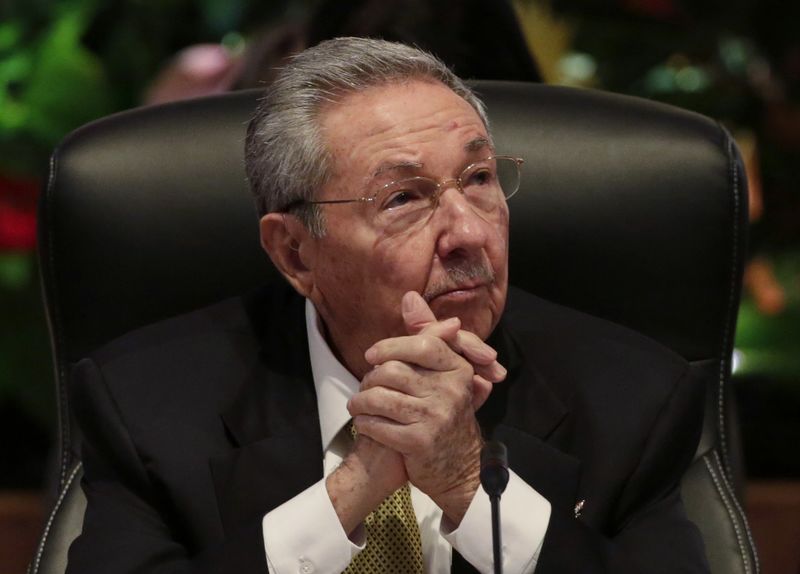By Daniel Trotta and Rosa Tania Valdés
HAVANA (Reuters) - Stepping out of his legendary brother's shadow, President Raul Castro has scored a diplomatic triumph and a surge in popular support with the deal that ends decades of open hostility with the United States.
For many Cubans, the restoration of diplomatic relations and President Barack Obama's promise to dismantle economic sanctions against the communist-run island have raised hopes of a more prosperous future.
Just as important, in exchange for one American prisoner and dozens of little-known Cubans, Castro won the freedom of three Cuban spies widely exalted at home as heroes who were wrongly imprisoned in the United States for 16 years.
The deal with Obama this week has triggered marches of support in the capital Havana. More and more, demonstrators chant "Viva Raul!", a significant change in a country long dominated by the outsized personality of his older brother, Fidel Castro.
Meanwhile, Fidel Castro has not been seen or heard from, secluded in retirement at his Havana villa.
Raul Castro, 83, took over as president from an ailing Fidel in 2008 and while he has pushed through a raft of market-style economic reforms, he has until now been a low-key leader, clearly lacking his brother's charisma.
But now, more Cubans appreciate his new brand of leadership.
"Raul Castro is doing things that Cuba needs. A lot of people didn't believe in him, but his work is on display. He is changing the country quietly, without speeches, and without bragging about it," said Jose Fernandez, a 55-year-old math teacher as he waited for a bus to work on Friday.
With Fidel Castro in retirement and rarely seen, any increase in Raul's popularity helps legitimize communist rule as Cubans adjust to his economic reforms and now a new relationship with the United States.
Reinaldo Haten, a 45-year-old Havana real estate agent, said the president is making his own mark on Cuba and changing it for the better."I thank Raul, because he is making history. With all that he has done in less than five years of his government, he has made a huge change in society," said Haten, who was looking for home buyers at an informal outdoor real estate market in Havana.
UNDERESTIMATED
One expert who has followed the Castro brothers for decades said Raul Castro has always been underestimated and that he maintains "a very firm, controlling grip" on the country.
"He's always been a very, very powerful figure," said Brian Latell, a former CIA analyst. "He was Fidel's most essential and indispensable ally. I don't think Fidel would have lasted as long as he did without Raul."
The younger Castro spent his entire childhood and 50 years of public life as an adult eclipsed by Fidel, the older brother he adored and obeyed. In the revolution that brought Fidel to power in 1959, Raul played a crucial role in turning the upstart rebels into an organised fighting force.
While Fidel Castro was the grandiose front man rallying Cubans to support the revolution and defy the United States, Raul Castro was his loyal defence minister, building a strong military.
Together they survived the U.S.-backed Bay of Pigs invasion, sent Cuban troops to Cold War battlegrounds in Africa and weathered the economic embargo and countless U.S. efforts to force them from power.
To their enemies, the Castro brothers will always be seen as partners who stole power and repressed the population, but they maintained significant popular support inside Cuba.
When Fidel Castro became sick in the summer of 2006 with an intestinal disorder, he handed power provisionally to Raul. The transfer became definitive in February 2008.
Raul proved himself more steady, organised and businesslike than the mercurial Fidel.
Many Cubans presume Raul consults with his brother on major decisions but Fidel's precise role is unknown. He occasionally writes a newspaper column or receives foreign dignitaries.
This week, it has been Raul's show. When he addressed the nation on Wednesday to announce the deal with Obama, he was in typical form, speaking without fanfare or hyperbole, calmly reading the statement in his deliberate, rough-edged baritone.
While the end of hostility between Cuba and the United States has the greater historic importance, the release of the three Cuban spies had a huge impact in Cuba.
It culminated a 16-year campaign to win the freedom of five "anti-terrorist heroes," who had been jailed in the United States for spying on anti-Castro exiles in Florida.
The other two had already returned home in 2013 and 2014 upon serving their terms, and the freedom of the final three was met with jubilation.
U.S. officials say the five were caught red-handed but in Cuba they were seen as heroes who infiltrated extremist groups at a time when anti-Castro extremists were bombing hotels in Havana.
Images of the men returning home, hugging Castro and their relatives in the airport, have dominated the state-controlled media in a Cuban feel-good story.
"His popularity has risen since that moment," said Carlos Alzugaray, a retired Cuban diplomat. "He has been pragmatic, giving Obama the space he needed to make this happen, allowing Obama to come off in a good light. He's been very smart about this."

Castro's daughter Mariela, a member of parliament, said on Friday she was proud of her father. "He's not interested in his place in history. He just wants Cuba to do well, for our ship to sail."
(Reporting by Daniel Trottta and Rosa Tania Valdés in Havana and David Adams in Miami; Editing by Kieran Murray)